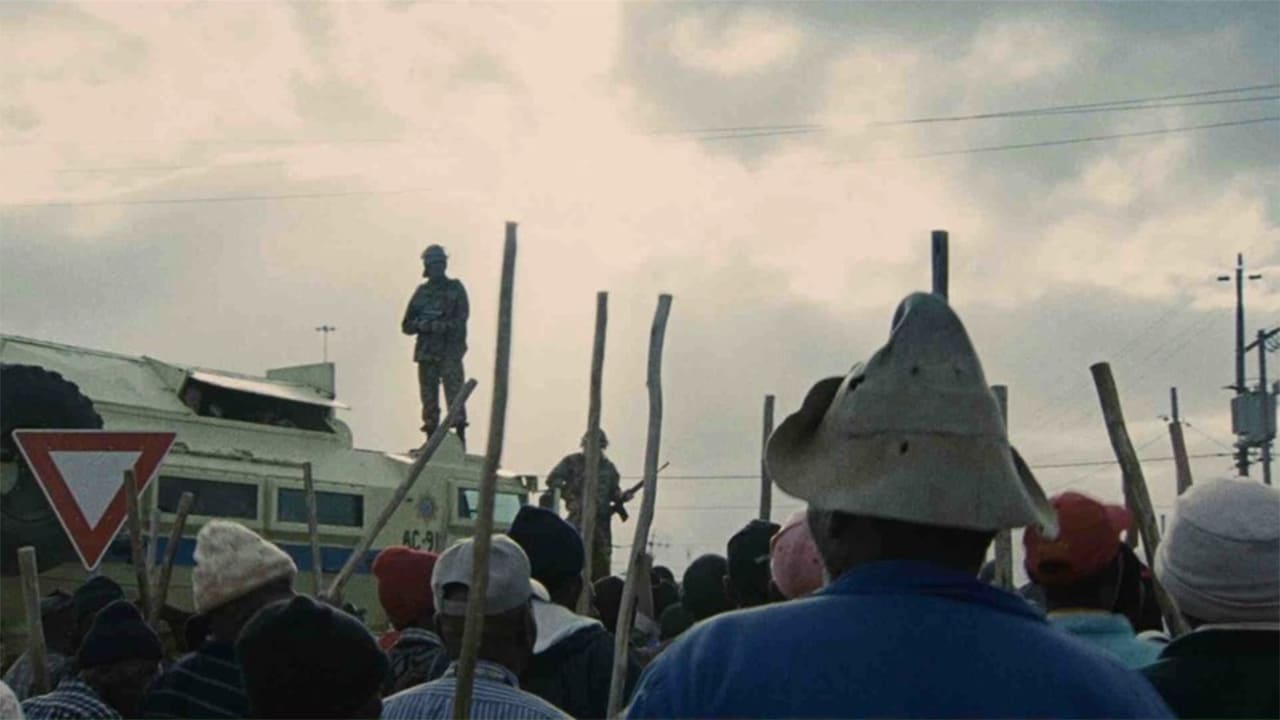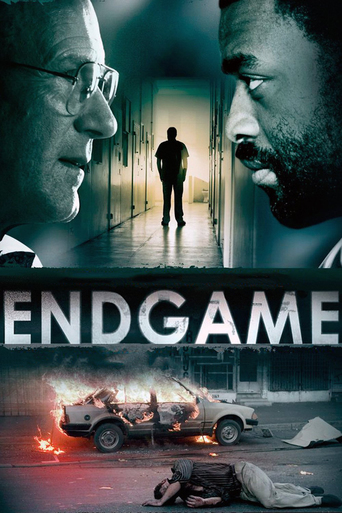

It's 1985 South Africa. Public affairs director of Consolidated Goldfields Michael Young (Jonny Lee Miller) sneaks into a township looking for people to secretly negotiate with. Eighteen months later in London, he makes contact with ANC Head of Information Thabo Mbeki (Chiwetel Ejiofor). He is stalked by government agents as he tries to convince Professor Willie Esterhuyse (William Hurt) to join in the effort. Head of intelligence Dr. Neil Barnard (Mark Strong) meets Nelson Mandela (Clarke Peters) in prison. Company head Rudolph Agnew (Derek Jacobi) finances the secret meetings but will deny any knowledge of Michael's plans if discovered. In 1988 Somerset, England, the group gathers to negotiate in a palatial estate.This is a drama of an important moment in history. The first half hour has great tension as Michael scrambles to organize this negotiation. The suspense is mostly lost once the group gathers at that mansion. The outcome is never in doubt. The actors are strong and they keep it watchable.
... View MoreWell, my knowledge of Apartheid is limited to my knowledge of a personality called Nelson Mandela and that he led a non-violent struggle for equality. That's about it. So, when I saw this title and the good reviews that it had received - I decided to try it out.Unfortunately for me, I was thrown into South African history (this was expected) and I was surrounded with over 20 character (this was not expected). Botha, Thabo, Mbeki, Alie Sachs, Wille Esterhuyse, some gold consolidations organization, a PR agent - within the first twenty minutes, my head was spinning. And thus, whenever a new character came on screen, I had to press the pause button and look up Wikipedia. That is how I watched this movie.So, for the first 35 minutes or so, I spent an equal amount of time reading Wikipedia (which was not bad, I got a lot of info) but what this means is that Endgame is not meant for the viewer who is not ready to break a sweat. Unless your knowledge of South African apartheid is not up to scratch, Endgame will make little sense by itself.However, once you know the characters and their motives the movie turns into an extremely compelling drama and a case study of how negations are done. This would make a terrific add-on to a history course. It is a very educational movie and the acting by William Hurt and Chiwetel Ejiofor was excellent and very convincing. The direction was also very well done and the script writing was very effective (considering the nature of the subject).In the end, this should have been a 3-4 hour miniseries. The treatment of Apartheid with proper introduction to the major characters ought to get that much time. Unfortunately Endgame is all that we get. Go ahead and watch it - it is worth the effort.
... View MoreDirector Pete Travis, who has attempted to make a name for himself by his "just sort of experimental" approach to filmmaking, is at it again with Paula Milne's Endgame. This time the objective appears to have been to shoot a full dramatization of actual events in a style much like those featured in PBS documentaries and bill it as a film suited for action-seekers. And with that in mind, the film's title is perhaps more a warning to audiences than anything else. Basically, if you're the kind of person who enjoys attending random chess tournaments featuring professional players whose names you probably forget before checkmate, there is a slight chance that you'll enjoy this film. Otherwise, you'll likely find yourself impatiently waiting for the end of the game. Somewhat to its credit, the portrayal seemed to be historically accurate, perhaps for the sole consideration that nothing incredibly unbelievable was depicted. The film, loaded with dialogue that would seem to neither advance the plot nor develop its characters, was overall excruciatingly slow-paced, offering audiences very little reward for all the wait. And to finally cement one's overwhelming sense of disappointment, Endgame's conclusion is regrettably just as anticlimactic as the film's most intense scenes (such as the "car chase" which is about as exhilarating as overtaking a farmer on a rural road). Though some themes seem to hint at the filmmakers' desire to offer new approach to the medium, this film was nothing groundbreaking.
... View MoreThe end of the hated Apartheid regime in South Africa is an uplifting story, but also, as told in this drama-documentary, an oddly undramatic one. There was no revolution, nor even a commitment to reform from within. Instead, as the system became increasingly untenable on the ground in the face of growing popular unrest, a series of unofficial negotiations between prominent Afrakaaners and the opposition were eventually endorsed by F.W. de Klerk shortly after his appointment as leader of the country, in a tacit acknowledgement that he had run out of other options. Undramatic maybe, but this is still a worthy retelling of the mechanics of the process. It's surprising to see Thabo Mbeki, later much criticised as a later south African leader when he denied that H.I.V. causes A.I.D.S., portrayed here in such a positive light. William Hurt is completely convincing as an Afrikaaner, while 'Wire' veteran Clarke Peters captures the essence of Nelson Mandela with a delicate performance . There's an element of hagiography in the film's treatment of the men who negotiated, but it is justifiably an uplifting story, especially in the knowledge of how, in the main, Mandela has managed to justify his status as virtual deity since his release; and how, for all its continuing problems, South African society has not collapsed with democracy.
... View More